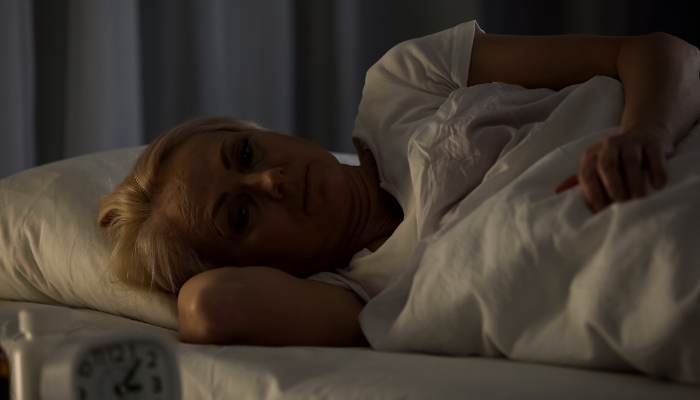In this blog series, The Caregiver’s Toolkit for Alzheimer’s and Dementia, we offer in-depth resources for those caring for a loved one with Alzheimer’s or dementia.
---
Caring for a loved one with Alzheimer’s or dementia can present many challenges, including wandering, confusion, and aggression. But you may not realize that sleep disturbances can also be common among individuals living with a memory-related cognitive disorder.
According to the Mayo Clinic, up to 25% of people with mild to moderate dementia and 50% of those with severe dementia suffer from sleep disturbances. These can range from chronic insomnia to periods of excessive sleep.
Sleep disturbances not only impact the individual with dementia, but their caregivers too. However, there are a number of strategies that can promote better, sounder sleep for those with Alzheimer’s and dementia.
Common Types of Sleep Disturbances
Sleep issues for those with Alzheimer’s and dementia can range from extreme tiredness to chronic insomnia. Many of those with Alzheimer’s will wake in the middle of the night and wander.
Another common behavior is sundowning, in which the person may experience heightened levels of anxiety or even aggression in the early evening and sometimes throughout the night. Sundowning may make it difficult to fall asleep or remain asleep during the nighttime hours.
Symptoms of sleep disturbances may include:
- Talking and/or snoring while asleep
- Waking up frequently in the night
- Wandering at night, which may also result in falls or other accidents
- Excessive tiredness during the day or falling asleep early
- Reduced cognitive function during the day, a result of poor sleep or excessive tiredness
Factors that Influence Sleep Disturbances
While the root of many of these sleeping issues may have their origins in Alzheimer's itself, they can also be exacerbated by mental, physical, and environmental factors. These can range from dim lighting and shadows that cause fear and confusion, to a natural need for less sleep, which is typical of aging adults.
Additional factors may include:
- Exhaustion, whether mental or physical
- Confusion and disorientation
- Changes to the natural rhythm or “body clock” caused by changes in the brain due to the progression of Alzheimer’s or dementia
- Medication — side effects may cause sleep issues
Treating Underlying Conditions
A number of underlying conditions can contribute to sleep disturbances, which is why it’s important to identify and treat or manage these conditions. For instance, depression can also cause excessive exhaustion or make it difficult to remain asleep. Chronic pain may also result in difficult sleeping.
Before treating the symptoms associated with the sleep disturbances, ensure that you understand its root cause. Check with your loved one’s doctor to see if there is a possible underlying medical condition, such as:
- Sleep apnea, which can both disrupt sleep and decrease its quality and may be caused by obesity or airway obstruction
- Restless leg syndrome, which causes uncomfortable sensations in the legs that encourage movement
- Pulmonary disease may also cause frequent awakenings, coughing, and shortness of breath
Strategies for Encouraging Better Sleep
Once any other underlying causes have been identified and addressed — or ruled out — there are a number of strategies that one can put in place to encourage better sleep.
- Create a daily routine that includes physical activities. Maintain a regular schedule for meals and bedtime, and carve out a regular time during the day for a supervised walk or other light exercise. Physical activity promotes better sleep.
- Introduce light therapy to help discourage daytime sleeping, and reduce agitation at bedtime. Ensure that there is plenty of bright light throughout the home during daytime hours to encourage the body’s natural response to the day/night cycle. As evening draws near, you may dim the lighting, but be sure it remains adequate for getting around the house, which will reduce fear and anxiety.
- Provide a relaxing environment. Help the person wind down each night by ensuring that there are no loud noises or disturbances from pets, children, or electronic devices. Keep the bedroom at a comfortable temperature, and consider adding a nightlight and keeping the hall light on to make it easy to navigate to the bathroom after dark.
- Limit stimulants and depressants, such as caffeine, alcohol, and nicotine. Caffeine or nicotine in the afternoon, or alcohol in the evening, can further exacerbate sleeping issues. Ensure the person avoids or reduces the use of these types of drugs.
More Caregiver Resources: The New Yorker’s Guide to Memory Care in Manhattan
If you’re beginning to search for memory care communities in the Manhattan area, download our guide to help you evaluate different aspects of each community. The New Yorker’s Guide to Memory Care in Manhattan is specifically designed to help caregivers find an appropriate care setting for a loved one. This guide includes:
- What’s typically included in a memory care program
- What questions you should ask when evaluating programs
- Examples of quality programs and offerings







